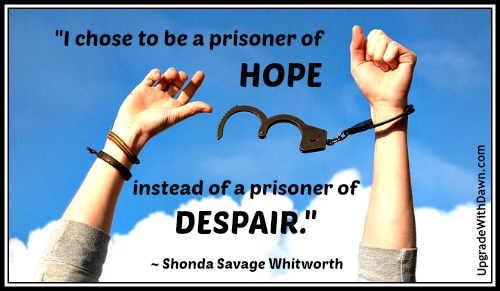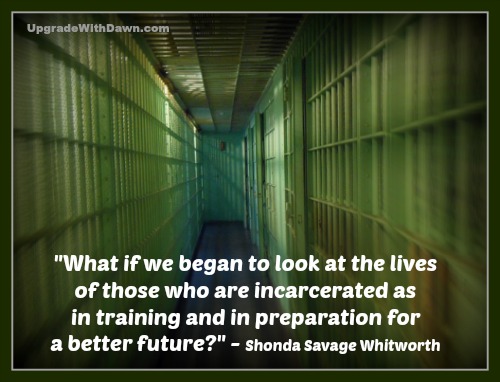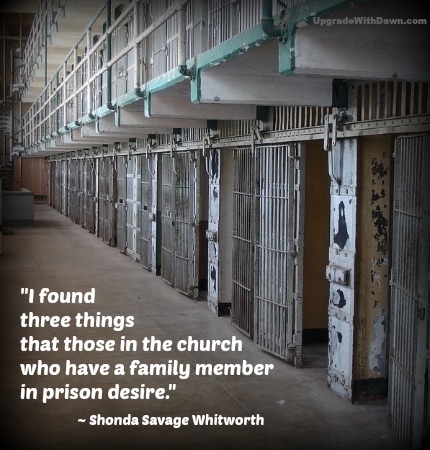Experience the Richness of God's Promises
Shonda Whitworth offers hope to those who have been impacted by incarceration, and in this Spiritual Life UPGRADE, she remind all of us to break into the freedom of God's promises.

"With that one late night call containing tragic news, life as I knew it vanished," Shonda said. "As shock took over my body, a familiar verse popped into mind. 'And we know that all things work together for good to those who love God, to those who are the called according to His purpose.'
"That wasn’t the verse I would have selected for this heart-crushing news. That Scripture seemed—cliché."
Though I (Dawn) never got a call like Shonda did, I've faced a number of shocks that made me wonder what God was up to. In one case, I found myself clinging to Romans 8:28 too. For me, the key words were "His purpose."
Shonda continues . . .
How could God work something good out of such a horrific situation?
The caller on the other end of the line informed us that one person’s life had been taken and another’s was in serious condition. And my son was one of the two arrested for this unimaginable tragedy.
In my church circles of influence, I heard Romans 8:28 quoted repetitiously when someone faced a difficult trial. Following this example, I even hugged others and quoted this verse in my feeble attempts to comfort them.
Yet, I found no comfort in that moment hearing it in my thoughts. So, I know I would NOT have wanted one of my loving Christian friends to hug me and say, “Hon it will be alright because God works all things together for good for those who love Him.”
In spite of my feelings about that verse at that moment, I shifted into autopilot mode and did what I had practiced for years—wrote out the Scripture and turned it into prayer.
Clinging to the paper, I prayed,
“Lord, if You are Who You say You are, then make this passage real for me and my family and the families who are grieving tonight. Only You can work something good out of this horrific situation.”
My reality merged into a portion of an unimaginable tragedy. At that juncture, I faced a choice—believe God’s Word or reject it.
I chose to believe.
Scripture may seem trite when it is overused or used inappropriately.
The Word of God is never void of His power, but the enemy wants us to think it is.
Looking back, I found two reasons I thought the Scripture was cliché.
1. Familiarity
Overused Scripture may breed familiarity. For those who attend church regularly, certain Scriptures become familiar to us.
Part of our human nature is that when something become generally known, it loses its awe.
No true prophecy comes from human initiative but is inspired by the moving of the Holy Spirit upon those who spoke the message that came from God (2 Peter 1:21, TPT).
Scriptures are literally God’s word to us. We must treat the written word as if the Lord is speaking to us face to face as He did with Moses.
God is holy, and we’re to reverence Him as such and that includes His Word.
2. Used inappropriately
Scriptures may be deemed misused if the person quoting it does not have a testimony to support it.
At the time of my son’s arrest, since no one in my circle of influence had walked through my type of trial, if they had quoted Romans 8:28 to me, I would have dismissed them.
As long as the Lord tarries, we are to comfort one another by sharing our victories of overcoming trials.
First Thessalonians 5:11 says,
Because of this, encourage the hearts of your fellow believers and support one another, just as you have been doing (TPT).
Our lives should demonstrate the power of God.
So, an appropriate way to encourage someone with Scripture is to be open, transparent, and vulnerable with how it worked in our lives—not just merely tossing out Scriptures to sound spiritual.
Since I choose to grab hold of God’s promise in spite of how it felt cliché, over time God demonstrated His faithfulness to bring about good things out of something tragic.
To summarize a few "good things"—
- My son fully committed his life to Christ and lives uprightly in confinement
- Many of my heart wounds have been healed.
- My husband and I started a nonprofit ministry to support families who face similar trials.
The enemy, who is the father of lies, twists the truth of the Scriptures.
If he can get us to dismiss God’s Word due to familiarity or misuse it by merely tossing it around without demonstrating its power, then we will miss the richness of God’s promises.
What is your approach to the Scriptures? Are you treating it with familiarity? Misusing it without the humble use of testimony as to its power? How can you change your approach?
 Shonda Savage Whitworth is the founder and president of Fortress of Hope Ministries, Inc. (https://fortressofhopeministries.com/), offering hope to those whose lives have been impacted by incarceration. Shonda connects with others through her personal experiences and testimony of God’s faithfulness in her life. You can read more stories about Shonda’s unexpected prison family journey on her blog. (https://www.shondasavagewhitworth.com/)
Shonda Savage Whitworth is the founder and president of Fortress of Hope Ministries, Inc. (https://fortressofhopeministries.com/), offering hope to those whose lives have been impacted by incarceration. Shonda connects with others through her personal experiences and testimony of God’s faithfulness in her life. You can read more stories about Shonda’s unexpected prison family journey on her blog. (https://www.shondasavagewhitworth.com/)
Graphic adapted, courtesy of Delanie at Lightstock.
 Post a Comment → Posted on
Post a Comment → Posted on  Thursday, June 11, 2020 at 10:15AM
Thursday, June 11, 2020 at 10:15AM  Fortress of Hope Ministries,
Fortress of Hope Ministries,  God's Word,
God's Word,  God's promises,
God's promises,  Hope,
Hope,  Incarceration,
Incarceration,  Prison,
Prison,  Promises of Scripture,
Promises of Scripture,  Shonda Savage Whitworth,
Shonda Savage Whitworth,  Shonda Whitworth,
Shonda Whitworth,  Upgrade with Dawn,
Upgrade with Dawn,  Word of God Upgrade Your Life
Word of God Upgrade Your Life  Spiritual Life
Spiritual Life 












